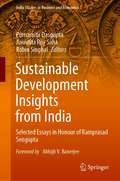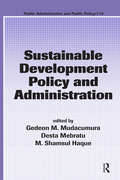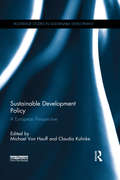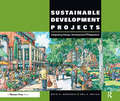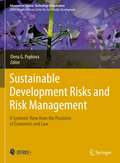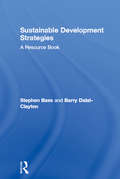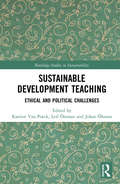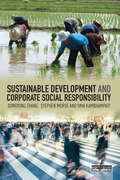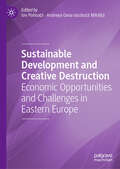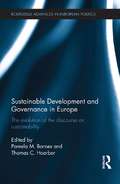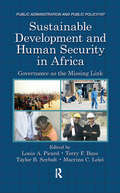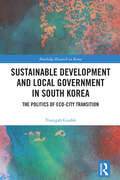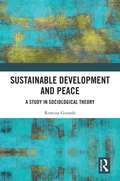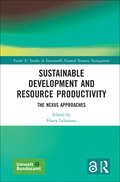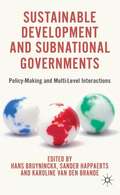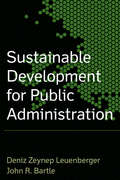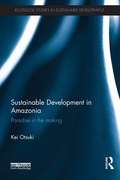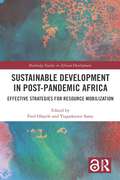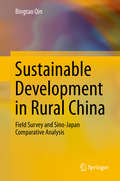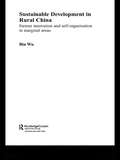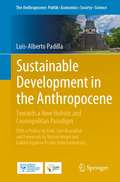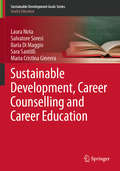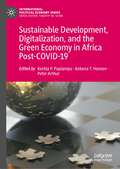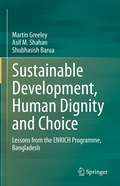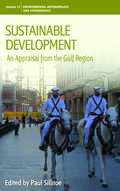- Table View
- List View
Sustainable Development Insights from India: Selected Essays in Honour of Ramprasad Sengupta (India Studies in Business and Economics)
by Purnamita Dasgupta Anindita Roy Saha Robin SinghalThis volume is a collection of essays that provide a comprehensive coverage of multiple aspects of the discourse on environment, development and sustainability. It is designed to bring in a host of perspectives highlighting the synergies and the trade-offs in this debate, showcasing research along with policy implications of putting research into use.The global discussion on sustainability paints the broad canvas for this book. This volume aims to probe some contemporary issues that will help in understanding the sustainability narrative in India. The topics span over a host of questions on energy, environment, natural resources and related constituents of development. The discourse further extends to the role of economic modelling, public policy debates, political intervention, stakeholders’ response, community participation and so on. The discussions are often based on empirical support, review of existing literature as well as policy analysis. With an ultimate aim to understand the overall development narrative of the people of India, the discourse takes in its ambit the nuances of resource utilisation, economic growth, COVID-19 impacts, competitiveness and market structures, urbanization, sectoral reforms, environmental hazards, climate change, pollution, natural resource accounting and management to name a few.The book is divided into four sections, namely, The Big Picture: Evolving Perspectives; The Energy Scenario: Dilemmas and Opportunities; Sustainability Cross-Cuts: Developmental Aspects and Externality Empirics: Knowledge and Practice. The first section contains commentaries on the overarching themes of economic growth, development and sustainability. It presents some emerging perspectives on the developmental crisis that has emerged through the environmental lens with additional focus on the need for inclusion of creativity, knowhow, technology and financial resources to achieve the ambitious SDG targets. The second section brings out the dilemmas and opportunities in the energy sector, that has been a key player in discussions of sustainability, especially for India where significant technological advances in conventional forms of energy supply coexists with fairly low levels of per capita energy consumption and energy security is a key challenge. The section on sustainability crosscuts attempts to highlight the problems and processes of mainstreaming the sustainability question into conventional thinking through the concepts of a circular economy, green accounting techniques, institutional and governance structures, public policy and inclusive growth, amongst others. The last section presents some empirical studies on environmental externalities, the unaccounted environmental effects of economic production and consumption and finally the behavioural aspects of the stakeholders that are crucial in the larger narrative of sustainable development.This edited volume contains contributions of reputed scholars from various Indian universities, research institutions and professionals from outside academia, who are proven experts in their fields. The link between policy, practice, and well-being of the large vulnerable population of India is the major focus of enquiry that will help researchers, practitioners and policy planners in conducting further research in energy, environment, resource and linked areas of development economics. General readers with an active interest in energy, environment, and economic development are also likely to find this book an interesting read, especially in the times of several environmental challenges facing humankind.
Sustainable Development Policy and Administration (Public Administration and Public Policy #118)
by Gedeon M. Mudacumura, Desta Mebratu and M. Shamsul HaqueSustainable Development Policy and Administration provides a learning resource describing the major issues that are critical to understanding the multiple dimensions of sustainable development. The overall theme of each contributed chapter in this book is the urgent need to promote global sustainability while adding insights into the challenges facing the current and future generations. This volume brings together diverse contributions that cover the multiple facets of development, resulting in a rich reference for students, development managers, and others interested in this emerging field.
Sustainable Development Policy: A European Perspective (Routledge Studies in Sustainable Development)
by Michael Von Hauff Claudia KuhnkeSustainable Development Policy: A European Perspective uses a variety of multidisciplinary perspectives to explore the ways in which sustainable infrastructures can play a more prominent and effective role in international development policy. Building on a solid introduction to sustainability and development policy, this book discusses ways in which viable reform can be promoted through coherent governing, the design of social security systems, education systems and the possibilities of fair trade as an alternative trading concept . Sustainable Development Policy generates a platform on which to encourage constructive dialogue on issues surrounding sustainability in the wake of the global scarcity of natural and economic resources. This edited collection will be of great interest to all students and lecturers of development studies and development policy, as well as researchers from other disciplines looking for an introduction to sustainable development policy and its practical applications.
Sustainable Development Projects: Integrated Design, Development, and Regulation
by David R. Godschalk Emil E. MaliziaDevelopment projects are the building blocks of urban growth. Put enough of the right projects together in the right way, and you have sustainable cities. But getting the pieces to stack up takes a feat of coordination and cooperation. In our market economy, developers, designers, and planners tend to operate in silos, each focused on its own piece of the puzzle. Sustainable Development Projects shows how these three groups can work together to build stronger cities. It starts with a blueprint for a development triad that balances sound economics, quality design, and the public good. A step-by-step description of the development process explains how and when planners can most effectively regulate new projects, while a glossary of real estate terms gives all the project participants a common language. Detailed scenarios apply the book’s principles to a trio of projects: rental apartments, greenfield housing, and mixed use infill. Readers can follow the projects from inception to finished product and see how different choices would result in different outcomes. This nuts-and-bolts guide urges planners, developers, and designers to break out of their silos and join forces to build more sustainable communities. It’s essential reading for practicing planners, real estate and design professionals, planning and zoning commissioners, elected officials, planning students, and everyone who cares about the future of cities.
Sustainable Development Risks and Risk Management: A Systemic View from the Positions of Economics and Law (Advances in Science, Technology & Innovation)
by Elena G. PopkovaThis book is devoted to a systemic study of socio-economic development risks arising in the Decade of Action, as well as the prospects for risk management in support of sustainable development. It aims to overcome fragmentary consideration of risks in the existing literature through their comprehensive coverage and the establishment of their interconnections from the perspective of sustainable development.The novelty of this book is that it provides a comprehensive accounting of socio-economic development risks in the Decade of Action, as well as a rethinking of these risks from a sustainable development perspective. The book also opens up the possibility of the most comprehensive and effective risk management in support of sustainable development. The practical relevance of the book stems from the fact that it describes and discusses practical experience in detail and accompanies the theoretical material with numerous case studies, including cases and frameworks with extensive coverage of international best practices.The book is intended for scholars, for whom the book forms a systemic scientific view of the risks of socio-economic development arising in the Decade of Action, as well as the prospects for risk management in support of sustainable development. The book is also of interest to practitioners, for whom it offers practical advice on risk management at all levels of the economy for sustainable development. Many examples from different countries make the book attractive to a wide international audience. The book is of particular interest to readers from Russia.
Sustainable Development Strategies: A Resource Book
by Barry Dalal-Clayton Stephen BassThis book is a cornerstone resource for a wide range of organizations and individuals concerned with sustainable development at national or local levels, as well as for international organizations concerned with supporting such development. Whilst the focus is on integrated strategies for sustainable development, the approaches and methods covered are equally relevant to poverty reduction, environmental and sectoral strategies, programme development and review. Agenda 21 called for all countries to develop sustainable development strategies. For such strategies to be effective there needs to be a real commitment. In every country, government at all levels, the private sector, and civil society, must work together in a true partnership, in transparent ways which enable genuine stakeholder participation. The necessary mechanisms and processes need to be coordinated to enable continuous learning and improvement. This resource book provides flexible, non-prescriptive guidance on how to develop, assess and implement national sustainable development strategies. It sets out principles and ideas on process and methods, and suggests how these can be used. It is based on an analysis of past and current practice, drawing directly from experience in both developed and developing countries. Following a discussion of the nature and challenges of sustainable development and the need for strategic responses to them, the heart of the book covers the main tasks in strategy processes. Individual chapters offer a rich range of guidance, ideas and case studies.
Sustainable Development Teaching: Ethical and Political Challenges (Routledge Studies in Sustainability)
by Leif Östman Katrien Van Poeck Johan ÖhmanThe aim of this book is to support and inspire teachers to contribute to much-needed processes of sustainable development and to develop teaching practices and professional identities that allow them to cope with the specificity of sustainability issues and, in particular, with the teaching challenges related to the ethical and political dimension of environmental and sustainability education. Bringing together recent scholarship on the topic, this book translates state-of-the-art academic research into teaching models, methods and tools. Starting with an outline of the challenge of sustainability, it offers insights and models for understanding the interesting yet ambiguous concept of ‘sustainable development’ and the complex process of transforming society in a more sustainable direction (Part I). It then goes on to provide a guide to preparing courses and lessons as well as tools for reflection about teaching practices and the multiplicity of approaches to addressing ethical and political challenges in sustainable development teaching (Part II). Finally, the book offers useful conceptual frameworks, models and typologies about the concrete design and implementation of sustainable development teaching (Part III). This book will be essential reading for students of education, as well as teachers in compulsory and higher education and sustainability education researchers.
Sustainable Development and Corporate Social Responsibility
by Stephen Morse Dongyong Zhang Uma KambhampatiCorporate Social Responsibility (CSR) has become an important concept in the last few decades. Although it originated in the developed countries of the West, the concept has been embraced and adapted by corporations and policy-making agencies in many developing countries. Not surprisingly, given the importance of growth and development as policy objectives in these countries, CSR has had a significant impact on sustainable development. Sustainable Development and Corporate Social Responsibility explores the evolution of CSR across the developed and developing world, with a particular focus on China and sustainable development. Through an extensive review of the literature and relevant case studies, the book examines whether CSR can make a contribution to sustainable development, how the patterns of CSR in developed Western economies compare to that in the rapidly growing economy of China, what trade-offs take place between CSR and economic growth as well as the future of CSR and its possible impact on the global sustainable development agenda. This book is a valuable resource for academics and upper-level undergraduate and postgraduate students in the fields of human/social geography, economics, business studies, sustainable development, development studies and environmental studies.
Sustainable Development and Creative Destruction: Economic Opportunities and Challenges in Eastern Europe
by Ion Pohoaţă Andreea Oana Iacobuţă MihăiţăThis book explores sustainable development from the perspective of the post-communist experience of Eastern Europe. Taking into account the specific characteristics of different countries within Eastern Europe, the contrast between economic theory and practice is highlighted. An understanding of the economic development of the Eastern Europe is presented to provide insights into the challenges, in particular the juxtaposition of new and old traditions, and opportunities for sustainable development in this area. This book highlights how the implementation of sustainable development policies is dependent on culture, institutions, history, and geography. It will be relevant to students and researchers interested in environmental economics and the economic development of Eastern Europe.
Sustainable Development and Governance in Europe: The Evolution of the Discourse on Sustainability (Routledge Advances in European Politics)
by Pamela M. Barnes Thomas C. HoerberThis book analyses the evolution of the sustainability discourse in the European Union, exploring the conditions necessary for sustainable development to move from a conceptual model into a model for action for strategic decision makers at all levels of governance. This book questions the extent to which the discourse on sustainability has become embedded into governance structures in Europe. It focuses on the importance of the nature of the language of the political discourse on sustainability and how ideas are communicated amongst the actors and stakeholders in the policy making process, as well as assessing the conceptual, political, institutional and operational barriers apparent across the European geographic region. Drawing case studies from numerous policy areas including climate change, EU emissions trading scheme, renewable energy, nuclear energy, the European integrated energy market, transport mobility, and environmental protection, expert contributors unveil a narrowing of the discourse on sustainability that has taken place in Europe. However, a considerable discontinuity remains between the economic and environmental objectives of sustainable development, and the authors argue that it is essential that conditions for a dynamic discourse, open to multiple participants, are developed. Sustainable Development and Governance in Europe will be of strong interest to students and scholars of comparative politics, governance, sustainable development and environmental politics and studies.
Sustainable Development and Human Security in Africa: Governance as the Missing Link (Public Administration and Public Policy)
by Terry F. Buss Louis A. Picard Taylor B. Seybolt Macrina C. LeleiMany new development initiatives have been introduced in Africa over the past few decades. Each of these has been heralded as marking a new era in the continent‘s development. However, many of these initiatives have failed to produce sustained results due to numerous challenges, including, most importantly, the lack of good governance. The Africa P
Sustainable Development and Local Government in South Korea: The Politics of Eco-city Transition (Routledge Research on Korea)
by Youngah GuahkThis book addresses one of the key issues of our time, the process of sustainable transition in modern, industrial societies, by looking at the dynamics associated with this objective at the decentralised local level in South Korea.The creation of eco-cities is a crucial aspect in the ongoing urbanisation of East Asia, and this book investigates specific examples of Korean local governments embarking on the path towards sustainable urban development and assesses their achievements. Making use of a wide range of sources and data collection methods, the book studies two diverse cases in great depth: Suwon City and Jeju Province. By systematically comparing the aims, strategies and decision-making processes in these two examples, the book illuminates the relative roles played by local leaders, central government, civil society representatives, and even international organisations.Highlighting the challenges, driving forces and limitations impacting sustainable transition at the local level, this book will be a valuable resource to students and scholars of Korean politics, decentralisation, urban governance, sustainable development and city planning.
Sustainable Development and Peace: A Study in Sociological Theory
by Romina GurashiThis book explores the growing attention that sociology has started to give to environmental issues in terms of peace and social justice. With a focus on sociological theory and its development, it reconstructs the long journey made by the social sciences towards the reconstruction, in a single theoretical paradigm, of the problems associated with the implementation of conditions of peace and sustainability. Beginning from the premise that environmental issues are never purely environmental, but entail political, economic and social implications, Sustainable Development and Peace offers an understanding of where we are heading and how, reflecting on present challenges and possible directions for the future. It will, therefore, appeal to scholars of sociology, social theory, development studies, politics and environmental studies.
Sustainable Development and Resource Productivity: The Nexus Approaches (Factor X: Studies in Sustainable Natural Resource Management)
by Harry LehmannThe fourth Factor X publication from the German Environment Agency (Umweltbundesamt, UBA), Sustainable Development and Resource Productivity: The Nexus Approaches explores the interdependencies of sustainable development paths and associated resource requirements, describing and analysing the necessities for a more resource efficient world. The use of and competition for increasingly scarce resources are growing worldwide with current production and consumption patterns of industrialised economies soon to reach the point where the ecosphere will be overtaxed far beyond its limits. Against this background, this volume examines the important initiatives to monitor resource use at the international, EU and national level. The current trends and challenges related to sustainable resource use are discussed, including international challenges for a resource efficient world, megatrends, justice and equitable access to resources. In the second part of the book, contributions examine implementation strategies. They assess the concept known as circular economy and discuss the theory of growth and the role of the financial and education systems. The final section places special emphasis on practical examples. Overall, the book presents concrete ways and examples of achieving more sustainability in practice. Discussing solutions for a more sustainable use of natural resources, this book is essential reading for scholars and students of natural resources and sustainable development and decision-makers and experts from the fields of policy development, industry and civil society.
Sustainable Development and Subnational Governments
by Hans Bruyninckx Sander Happaerts Karoline Van den BrandeThis book highlights the importance of the subnational level of governance in relation to sustainable development, exploring how subnational governments have taken up the challenge to design sustainable development policies and their involvement in international decision-making on sustainable development.
Sustainable Development for Public Administration
by John R. Bartle Deniz Zeynup LeuenbergerThis groundbreaking text focuses on the application of sustainability and sustainable development theories to public administration practice. It's designed to guide planning, resource management, and outcomes measurement for future and current non-profit and public managers. The book introduces sustainable development and related theories; ties these theories to public administration practice; and, elaborates on applications to specific PA specializations including energy management, transportation, water, waste management, urban development, wildlife conservation, and higher education. It also includes a chapter specifically geared to outcome measurement of sustainability goals in public and non-profit agencies.
Sustainable Development in Amazonia: Paradise in the Making (Routledge Studies in Sustainable Development)
by Kei OtsukiThis book argues against the assumption that sustainability and environmental conservation are naturally the common goal and norm for everyone in Amazonia. This is the first book focusing on agency, reflexivity and social development to address sustainable development in the region. It discusses the importance of looking into societal dynamics in order to deal with deforestation and sustainable development policies through the ethnography of an Amazonian settlement named New Paradise. This book demystifies utopian and overtly conservationist views that depict the Amazon rainforest as a troubled paradise. Engaging with social theory of practice with particular focus on emergentist perspectives and Foucault’s analysis of ‘heterotopia’, the author shows that Amazonia is a set of settlement heterotopias in which various local and external initiatives interact to make up real, lived-in places. The settlers’ placemaking continually rearranges power and material relations while the process usually emphasises utopian developmentalist and conservationist policy intervention. This book explores in detail how, as power relations are arranged and governance reshaped, sustainable development and construction of a green society also need to become a goal for the settlers themselves. The book’s insights on the relationship between the sustainable development frameworks used in environmental policy, and ongoing societal development on the ground inform debate both within Amazonia, and in comparable communities worldwide. It also offers institutional pathways to realise new, more engaging, policy intervention for development professionals and policy makers.
Sustainable Development in Post-Pandemic Africa: Effective Strategies for Resource Mobilization (Routledge Studies in African Development)
by Fred OlayeleWith both domestic and external financing expected to dry up in the wake of the COVID-19 pandemic, this book argues that there is a need for fresh ideas and new strategies for achieving sustainable development in Africa. In addition to triggering the most severe recession in nearly a century, the COVID-19 pandemic has disrupted global value chains, causing unprecedented damage to healthcare systems, economies, and well-being, hitting the world’s most vulnerable people the hardest. Even before the pandemic, Africa was suffering from the effects of low commodity prices, sluggish GDP growth, high debt levels, low levels of domestic savings, and weak private capital inflows. This book argues that now, as the continent emerges from the current crisis, it will be important to reconfigure current financing sources under a forward-looking framework that incorporates other non-traditional financing tools and mechanisms such as public-private partnerships, sovereign wealth funds, gender lens investing, new growth drivers, and emerging and disruptive technologies. Finally, the book concludes by adopting a sectoral approach and examining the real economy impacts of new growth drivers such as agriculture value chains, industrialization, tourism, and the blue economy. Drawing on a range of original research as well as insights from practice, this book will be a useful guide for Global Development and African Studies researchers, as well as for policy makers, investors, finance specialists, and global business practitioners and entrepreneurs.
Sustainable Development in Rural China
by Bingtao QinThe book provides a study of sustainable development in rural China. Because of its huge population and vast land area, this is an important issue not only for China but for the whole world. The research presented is both multi aspect and systematical. It can be likened to a tree where the trunk is the three main aspects: economy, environment and rural society, and the five main branches are agricultural development, industrial pollution, energy security, labor migration and social welfare, and these are the book's five main topics. The research methods of field survey and Sino-Japanese comparison will be of particular interest to readers. The field survey enables readers to become familiar with the environment of rural China. Survey reports and data provide readers with a more profound and vivid understanding of rural China and comparative methods benefit readers from different countries and a variety of cultural backgrounds. For Japanese readers or readers who understand Japanese well, they make China more easily understandable, while Chinese readers gain insights into the country's future and the direction of current developments based on a Japanese frame of reference. For readers outside China and Japan, this book serves as an introduction to Chinese society and also to Japan. Finally, the author provides various paradigmatic scenarios, including default and sustainable. After reading this book, readers will be aware that the earlier and the more we pay attention to these issues, the easier it will be for rural China to achieve a sustainable situation.
Sustainable Development in Rural China: Farmer Innovation and Self-Organisation in Marginal Areas
by Bin WuSustainable development in marginal areas, especially in those where rural poverty and environmental degradation are interwoven, is a great concern of development agencies worldwide, and much effort is put into development programmes, technology transfer schemes and so on. The problem is particularly acute in China, where increasing regional differences and inequality are eroding governmental poverty reduction efforts and exacerbating ecological crises. This book, based on extensive original research, examines the situation in China, especially in the Loess Plateau of Shaanxi Province. It explores in particular how farmers have organised themselves to initiate technical innovation, and considers communication networks and co-operative mechanisms. It discusses successful self-organisation, and how interfaces with external development agencies and with institutional innovation might be handled, highlighting the potential of farmer innovation initiatives, especially when they are linked with external development and environmental improvement programmes.
Sustainable Development in the Anthropocene: Towards a New Holistic and Cosmopolitan Paradigm (The Anthropocene: Politik—Economics—Society—Science #29)
by Luis-Alberto PadillaIn the Anthropocene sustainable development responds to socio-economic, environmental and political crises provoked by humankind due to global warming and the great acceleration of human intervention in ecosystems. This book introduces readers to current debates on sustainable development and to a holistic and multidisciplinary approach. Regional integration and supranational institutions are fundamental for sustainable development. The democratisation of the international system requires a new multilateralism. Global problems of demography, economic ideology of unlimited growth, the prevailing technocratic paradigm, consumerism, problems of waste, fossil fuels, industrial food production, use of fertilisers, water management and climate change are discussed, and the importance of multilateral agreements for security, sustainable peace and development is explored. This planetary crisis may be solved by international cooperation based on the UN sustainable development goals.This book - provides a concise synthesis of the main subjects of sustainable development studies- links development studies to multilateral diplomacy as practised by UN bodies and organisations- gives a new holistic and multidisciplinary approach to environmental and social sciences in the Anthropocene epoch.
Sustainable Development, Career Counselling and Career Education (Sustainable Development Goals Series)
by Laura Nota Salvatore Soresi Ilaria Di Maggio Sara Santilli Maria Cristina GinevraThis book is based on the Life Design paradigm and discusses the efforts made to overcome the matching paradigm between individuals and their work contexts, in order to guarantee the adoption of an active role for future career planning. Starting from the evolution of career counselling and vocational guidance in the 20th century and then following the more updated reflections in the Life Design paradigm, this book discusses research results from the Larios Laboratory (Padova, Italy) in collaboration with numerous international colleagues and institutions. These results show that career counselling and vocational designing can not only help people to plan their future in agentive ways, but also to help them getting out of the ‘mists of the present’ and to project themselves into a future that is yet to be created. This future is aligned by the world of research and international institutions, such as the UN and WHO, and follows the 2030 Agenda for Sustainable Development, with particular attention to Sustainable Development Goals 4, 8 and 12. This book reveals how trajectories can be created from one’s own mission, realized with the help of others and newly acquired strengths. It shows how career counselling and vocational designing can help people to build their own future from an inclusive and sustainable perspective, based on social justice, and to help build a better future for all.
Sustainable Development, Digitalization, and the Green Economy in Africa Post-COVID-19 (International Political Economy Series)
by Kobena T. Hanson Korbla P. Puplampu Peter ArthurThis book examines sustainable development in the broader framework of Africa post COVID-19. Specifically, the book studies governance and digitalization from the perspective of natural environment management, climate change, the green economy, as well as agriculture and education. Digitalization supports the deepening of natural resource governance by assessing extractive practices, sovereign wealth funds and the emerging discourse on global warming and green economic policies. This analytical exercise will better inform economic and socio-political policies and institutions for African development. The book, against the backdrop of the United Nations Agenda 2030 and the African Union Agenda 2063, offers unique insights on digitalization, governance, the green economy, and natural resource regime in Africa post COVID-19.
Sustainable Development, Human Dignity and Choice: Lessons from the ENRICH Programme, Bangladesh
by Martin Greeley Asif M. Shahan Shubhasish BaruaThe Enhancing Resources and Increasing Capacities of Poor Households Towards Elimination of their Poverty (the ENRICH) programme is being implemented by Palli Karma-Sahayak Foundation (PKSF), which is a government-established Foundation and implements its programmes through Partner NGOs. The efforts are concerned with the perspective of eradicating poverty, aiming at enabling individuals to live a life that is humanly dignified. In doing so, the ENRICH programme focuses on creating opportunities for them to exercise freedom in determining their choices. The approach based on this understanding, i.e. poverty reduction/elimination and economic improvement strategies, coupled with interventions that ensure access to universal human rights, should promote freedom of choice leading to a dignified life and has shaped the programme contents and implementation framework. The ENRICH programme has been conceptualized and promoted by the current Chairman of PKSF, Dr. Qazi Kholiquzzaman Ahmad, who was appointed to the position in November 2009. In essence, the ENRICH programme is innovative, integrated, human-centred, taking into consideration the multidimensionality of human life and living, involving socio-economic and environmental dimensions. It focuses on human capability, both individual and collective and social capital formation to facilitate the way forward, the ultimate goal being humanly dignified living of all those who are deprived of this fundamental call of humanity.
Sustainable Development: An Appraisal from the Gulf Region
by Paul SillitoeWith growing evidence of unsustainable use of the world's resources, such as hydrocarbon reserves, and related environmental pollution, as in alarming climate change predictions, sustainable development is arguably the prominent issue of the 21st century. This volume gives a wide ranging introduction focusing on the arid Gulf region, where the challenges of sustainable development are starkly evident. The Gulf relies on non-renewable oil and gas exports to supply the world's insatiable CO2 emitting energy demands, and has built unsustainable conurbations with water supplies dependent on energy hungry desalination plants and deep aquifers pumped beyond natural replenishment rates. Sustainable Development has an interdisciplinary focus, bringing together university faculty and government personnel from the Gulf, Europe, and North America -- including social and natural scientists, environmentalists and economists, architects and planners -- to discuss topics such as sustainable natural resource use and urbanization, industrial and technological development, economy and politics, history and geography.
